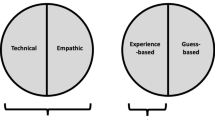Abstract
In this article we describe a curricular strategy that improves the full range of skillsets critical to capstone success. Improved Capstone (ICap) was developed and implemented across the thermo-fluids topical area in the undergraduate Mechanical Engineering Technology Program at the University of Hartford. ICap experiential courses sequentially introduce challenging and open-ended assignments that foster cognitive learning. Using a scaffolding structure, assignments are organized into three modules: (1) classical, (2) transitional, and (3) design of an experiment. ICap enables students to assume greater responsibility for their learning experiences and liberates the instructor to become a mentor. Consequently, higher level skills important in the capstone course are strengthened: critical thinking, quantitative reasoning, teamwork, communications, information literacy, and design process.
Similar content being viewed by others

References
Butler, W. M., & Moses, W. M. (2005). Introducing experimental design in mechanical engineering laboratories. Proceedings of the American Society for Engineering Education Annual Conference. Paper 2005–246.
Chapman, C. (1998). A good idea. But it might not work. The National Education Association Higher Education Journal. Thought & Action, Fall, 135–136.
Culver, R. S., & Hackos, J. T. (1982). Perry’s model of intellectual development. Journal of Engineering Education, 73, 221–226.
Culver, R. S., Woods, D., & Fitch, P. (1990). Gaining professional expertise through design activities engineering education. Journal of Engineering Education, 80, 533–536.
Farahbakhsh, K., & Stiver, W. (2007). Student-led design, building, testing and usage of in-course experimental laboratories. Proceedings of the American Society for Engineering Education Annual Conference. Paper 2007–1010.
Felder, R. M., & Brent, R. (2003a). Designing and teaching courses to satisfy the ABET engineering criteria. Journal of Engineering Education, 91(1), 7–25.
Felder, R. M., & Brent, R. (2003b). Learning by doing. Chemical Engineering Education, 37(4), 282–283.
Felder, R. M., & Brent, R. (2004). The intellectual development of science and engineering students. Part 1. Models and challenges. Journal of Engineering Education, 93(4), 269–277.
Felder, R. M., & Silverman, L. K. (1988). Learning and teaching styles in engineering education. Journal of Engineering Education, 78(7), 674–681.
King, P. M., & Kitchner, K. S. (1994). Developing reflective judgment. San Francisco, CA: Jossey-Bass.
Milanovic, I. M., & Eppes, T. A. (2008). Modular, adaptable, and reusable approach to thermal-fluids outwitting the norms. Proceedings of the American Society for Engineering Education Annual Conference. Paper 2008–440.
Millis, B. J., & Cottell, P. (1998). Cooperative learning for higher education faculty. Phoenix, AZ: American Council on Education and Oryx Press.
Pavelich, M. J. (1996). Helping students develop higher-level thinking: Use of the Perry model. Salt Lake City, UT: Fontiers in Education Conference Proceedings.
Pavelich, M. J., & Moore, W. S. (1996). Measuring the effect of experiential education using the Perry model. Journal of Engineering Education, 85(4), 287–292.
Perry, W. G. (1970). Forms of intellectual and ethical development in the college years. New York, NY: Holt, Rinehart and Winston.
Rogers, G. (2011). Assessment planning. Retrieved January 29, 2011, from http://abet.org/assessment.shtml
Sticklen, J., Amey, M., Eskil, T., Hinds, T., & Urban-Lurain, M. (2004). Application of object-centered scaffolding to introductory MatLab. Proceedings of the American Society for Engineering Education Annual Conference, Paper 2004–1626.
Truax, D. D. (2004). Improving the learning process of laboratory instruction. Proceedings of the American Society for Engineering Education Annual Conference. Paper 2004–918.
Vygotsky, L. S. (1962). Thought and language. Cambridge, MA: MIT Press.
Vygotsky, L. S. (1978). Mind in society. Cambridge, MA: Harvard University Press.
Willis, L. & Wellington, S. (2006). Enhancing the design and assessment of practical work in the engineering curriculum. The Higher Education Academy – Engineering Subject Centre. Retrieved from http://www.engsc.ac.uk/downloads/awards/wellington.pdf
Author information
Authors and Affiliations
Corresponding author
Rights and permissions
About this article
Cite this article
Eppes, T.A., Milanovic, I. & Sweitzer, H.F. Strengthening Capstone Skills in STEM Programs. Innov High Educ 37, 3–10 (2012). https://doi.org/10.1007/s10755-011-9181-0
Published:
Issue Date:
DOI: https://doi.org/10.1007/s10755-011-9181-0



